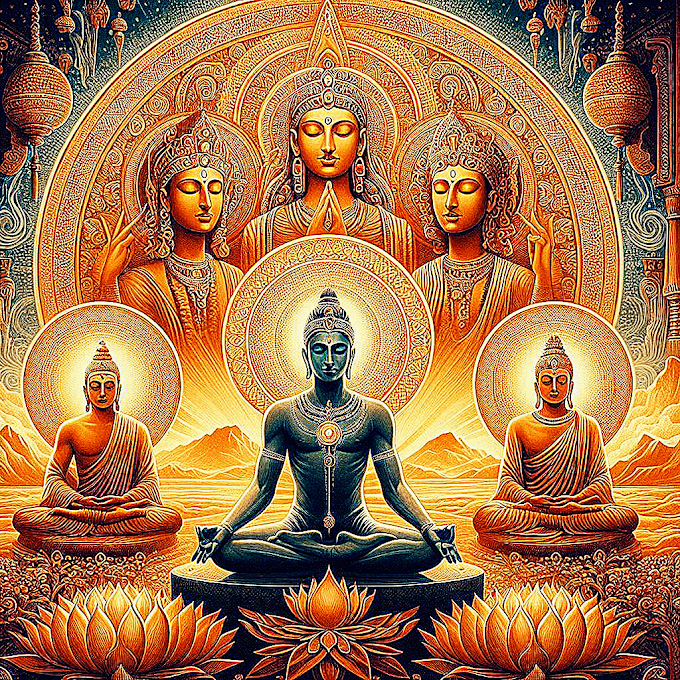The Concept of Sthitha Prajña in the Bhagavad Gita
The term Sthitha Prajña (स्थितप्रज्ञ) refers to a person of steady wisdom or equanimity, who remains balanced and unaffected by external circumstances. This ideal is outlined in the Bhagavad Gita, primarily in Chapter 2, verses 55-72. These verses, forming part of the dialogue between Lord Krishna and Arjuna, describe the qualities, mindset, and practices of a spiritually enlightened individual who has transcended the fluctuations of the mind and emotions.
Definition of Sthitha Prajña
- Literal Meaning:
- Sthitha: Stable, steady
- Prajña: Wisdom or intelligence
Thus, Sthitha Prajña denotes one whose wisdom is firmly rooted in self-awareness and spiritual realization, unaffected by desires, attachments, or aversions.
- Philosophical Essence:
Sthitha Prajña is a state of being where the individual achieves supreme equanimity through self-control, detachment, and a deep connection with the universal truth. It signifies liberation from ego-driven impulses and harmony with the cosmic order.
Key Characteristics of Sthitha Prajña
Freedom from Desires (Verse 2.55):
- "Prajahati yada kaman sarvan partha manogatan, Atmany evatmana tushtah sthitaprajnas tadocyate."
- A Sthitha Prajña has relinquished all desires that arise in the mind and remains content within the self, finding fulfillment in the inner atman (soul).
Equanimity in Pleasure and Pain (Verse 2.56):
- "Duhkhesv anudvigna-manah sukhesu vigata-sprhah, Vita-raga-bhaya-krodhah sthitadhir munir ucyate."
- Such a person is not disturbed by sorrow, does not crave happiness, and is free from attachment, fear, and anger.
Detachment from Outcomes (Verse 2.57):
- "Yah sarvatranabhisnehah tat tat prapya subhasubham, Nabhinandati na dvesti tasya prajna pratisthita."
- A person of steady wisdom remains detached from favorable and unfavorable outcomes, neither rejoicing nor rejecting them.
Control over the Senses (Verse 2.58):
- "Yada samharate cayam kurmo 'nganiva sarvasah, Indriyanindriyarthebhyas tasya prajna pratisthita."
- Like a tortoise withdrawing its limbs, a Sthitha Prajña withdraws the senses from their objects to maintain self-mastery.
Established in Self-Knowledge (Verse 2.61):
- "Tani sarvani samyamya yukta asita mat-parah, Vase hi yasyendriyani tasya prajna pratisthita."
- Such a person is anchored in higher consciousness and controls their senses through steadfast devotion.
Practices to Attain Sthitha Prajña
- Detachment (Vairagya):
- Renounce desires and ego-driven attachments to material objects and relationships.
- Self-Discipline (Yama and Niyama):
- Follow ethical and moral disciplines, as outlined in yogic philosophy, to cultivate inner purity.
- Meditation (Dhyana):
- Develop a focused mind through consistent meditation, which aids in achieving stillness and clarity.
- Devotion (Bhakti):
- Surrender to the divine will and cultivate faith in the cosmic plan to transcend ego.
- Knowledge (Jnana):
- Reflect on spiritual truths and seek higher understanding, as described in the Gita's teachings.
Relevance of Sthitha Prajña in Modern Life
Stress Management:
The ability to remain balanced and composed amidst challenges helps in managing stress effectively.Emotional Resilience:
Detachment from outcomes fosters emotional stability, allowing one to face failures and successes with equanimity.Conflict Resolution:
A person with steady wisdom acts from a place of understanding and harmony, avoiding reactive behaviors in personal and professional interactions.Spiritual Fulfillment:
Achieving the state of Sthitha Prajña leads to inner peace and a sense of universal connectedness.
Verses of Inspiration for Sthitha Prajña
Verse 2.70:
"Aapuryamanam acala-pratishtham samudram apah pravishanti yadvat, Tadvat kama yam pravishanti sarve sa shantim apnoti na kamakami."- Just as the ocean remains unaffected by the rivers that flow into it, a Sthitha Prajña remains unmoved by the influx of desires.
Verse 2.71:
"Vihaya kaman yah sarvan pumamsh carati nihsprhah, Nirmamo nirahankarah sa shantim adhigacchati."- One who renounces all desires, lives free from longing, and is devoid of ego attains supreme peace.

.png)

.png)
.png)


.png)
.png)
.png)
.png)
.png)
